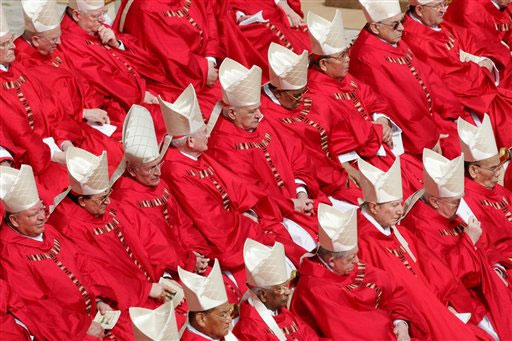Sometimes contributor to Whosoever Desires, Paddy Gilger, S.J., is behind a new Jesuit online venture, a new page called The Jesuit Post. Yours truly has an article on the page, in which readers of Whosever Desires might be interested. Here’s how it begins:
If you listened carefully to the new edition of the Roman Missal rolled out this Advent, you might remember hearing mention of a strange menagerie of heavenly creatures.
The Advent Prefaces to the Eucharistic Prayer—the part that begins “It is truly right and just” and ends with us all singing “Holy, Holy, Holy Lord God of hosts”—invoke the songs of Angels, Archangels, Thrones, Dominions, and Powers; other Prefaces throughout the year throw in Virtues and Seraphim for good measure. But what exactly are all these heavenly gizmos the priest is inviting us to join in acclamation?
It is perhaps best to start by pointing out that in this context, thrones are not chairs sat upon by kings; dominions are not regal estates; and virtues have nothing to do with the established habits of decent human beings. All of these words refer to types of angels mentioned in Sacred Scripture.
Now I am no expert in either angelology – though I do like saying the word – or Biblical studies, but you don’t have to be a specialist to notice how thoroughly permeated with spiritual beings the world of the Bible is. We tend to gloss over mention of the heavenly hierarchies these days, not talking about them much because of how foreign the notion of angels is to our own worldview. And we don’t talk about thrones and dominions because, well, we don’t even know how to talk about them.




 Posted by Anthony Lusvardi, SJ
Posted by Anthony Lusvardi, SJ 


 Whenever the consistory rolls around, I’m always curious to see which scholarly octogenarians receive the red hat honoris causa. Seeing a Jesuit among the cardinal-designates is always significant, inasmuch as it suggests the sort of theological service the Holy Father hopes for from the Society of Jesus. This year’s consistory singled out for honorable mention Fr. Karl J. Becker, S.J., emeritus professor of theology at the Gregorian University in Rome. Since he is unlikely to be a household name even among the churchgoers, I thought I would give a brief theological introduction.
Whenever the consistory rolls around, I’m always curious to see which scholarly octogenarians receive the red hat honoris causa. Seeing a Jesuit among the cardinal-designates is always significant, inasmuch as it suggests the sort of theological service the Holy Father hopes for from the Society of Jesus. This year’s consistory singled out for honorable mention Fr. Karl J. Becker, S.J., emeritus professor of theology at the Gregorian University in Rome. Since he is unlikely to be a household name even among the churchgoers, I thought I would give a brief theological introduction.


